613 Search Results for a year of core
August 18, 2016
by Carole Zangari -
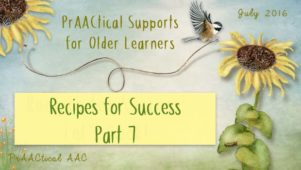
Welcome back to the PrAACtical Supports series, highlighting the work of the AT team at the Children’s Hospital of Richmond at VCU (CHoR). Meghan Reitz, an SLP who has worked at CHoR for over 3 years, returns to share activity ideas for older learners and downloadable handouts for their caregivers. She received her Master’s in SLP from the University of Virginia., which provides comprehensive services for pediatric healthcare. The CHoR AT Program is one of few comprehensive AT programs in Central Virginia, providing AT evaluations, equipment and training to people of all ages, enabling children and adults with disabilities to function more independently. CHoR’s AT team consists of 4 SLPs, 2 OTs, a PT, and a Therapy Practice Assistant. In addition to completing transdiciplinary evaluations and treatments, CHoR’s AT team is responsible for supporting staff and sharing AT information to five CHoR therapy centers throughout Central Virginia. Meghan has a passion for working... [Read More...]
August 11, 2016
by Carole Zangari -
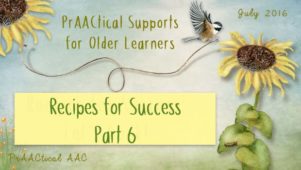
Welcome back to the PrAACtical Supports series, highlighting the work of the AT team at the Children’s Hospital of Richmond at VCU (CHoR). Meghan Reitz, an SLP who has worked at CHoR for over 3 years, returns to share activity ideas for older learners and downloadable handouts for their caregivers. She received her Master’s in SLP from the University of Virginia., which provides comprehensive services for pediatric healthcare. The CHoR AT Program is one of few comprehensive AT programs in Central Virginia, providing AT evaluations, equipment and training to people of all ages, enabling children and adults with disabilities to function more independently. CHoR’s AT team consists of 4 SLPs, 2 OTs, a PT, and a Therapy Practice Assistant. In addition to completing transdiciplinary evaluations and treatments, CHoR’s AT team is responsible for supporting staff and sharing AT information to five CHoR therapy centers throughout Central Virginia. Meghan has a passion for working... [Read More...]
August 4, 2016
by Carole Zangari -
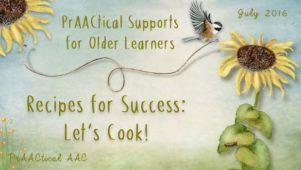
Thanks to all of you who reached out with appreciation for the ideas and resources shared in last month’s PrAACtical Supports posts (you can see those here). We’re delighted to continue the series and grateful to the AT team at the Children’s Hospital of Richmond at VCU (CHoR), which provides comprehensive services for pediatric healthcare. The CHoR AT Program is one of few comprehensive AT programs in Central Virginia, providing AT evaluations, equipment and training to people of all ages, enabling children and adults with disabilities to function more independently. CHoR’s AT team consists of 4 SLPs, 2 OTs, a PT, and a Therapy Practice Assistant. In addition to completing transdiciplinary evaluations and treatments, CHoR’s AT team is responsible for supporting staff and sharing AT information to five CHoR therapy centers throughout Central Virginia. Today’s guest blogger is team member Meghan Reitz, an SLP who has worked at CHoR for the past... [Read More...]
August 3, 2016
by Carole Zangari -
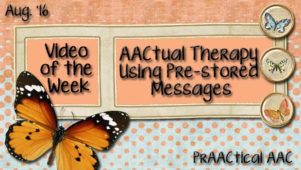
In the past few years, we’ve written a lot about the value of AAC systems that are rich in single core vocabulary words. Our position has always been, however, that many users of AAC will also benefit from fringe vocabulary words and selected prestored messages. You can read more about that here. To be sure, pre-stored messages, including phrases, sentences, and full questions, have their drawbacks. The main downside relates to the lack of flexibility they offer. Once programmed into a device, the communicator has to use them just the way they are. If he/she wants to say a variation of that message, they are out of luck. In the context of a robust system, however, this isn’t as problematic as it sounds. Individuals who have been provided with robust AAC systems can go to their single word vocabulary to be more precise if the pre-stored message doesn’t capture exactly... [Read More...]
July 27, 2016
by Carole Zangari -
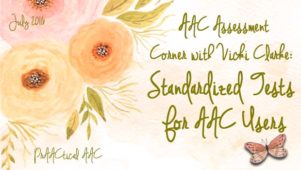
Do you have a love-hate relationships with formal testing? Are you required to use normed tests with your minimally verbal clients? Looking for recommendations on which tests to use? AAC specialist Vicki Clarke has you covered! Like many of you, I’ve had mixed feeling when it comes to using normed assessment instruments with my AAC learners, particularly when we needed to modify the test materials or administration procedures in order for them to be able to participate and respond. If the client can’t point to pictures, give a verbal response, or sit through an entire test, we have no choice but to adapt how the test is administered. As we all know, when we adapt test materials (e.g., putting the test items on an eye gaze board) or procedures (e.g., partner-assisted scanning), we lose the ability to use the normative data. We can, though, compare our learners to themselves at... [Read More...]
July 7, 2016
by Carole Zangari -
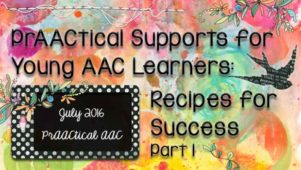
One of the most gratifying things about the AAC field is being able to connect with talented professionals who love what they do and are passionate about supporting learners with little or no functional speech. I am humbled by the incredibly generous ways in which clinicians are supporting their clients and one another. Today’s post, by SLP Sara Barnhill, is a case in point. Sara has worked at Children’s Hospital of Richmond at VCU (CHoR) for seven years. She is a member of the Assistive Technology (AT) Core team and completes multiple AAC evaluations per week as well as AAC therapy. Her caseload includes patients in clinics, out-patient therapy, and on the Transitional Care Unit which provides pediatric long-term care. Through her specialty areas, Sara has discovered a love for sharing information and training others. Sara has presented in multiple conferences at the local, state, and national levels. Sara has... [Read More...]
June 1, 2016
by Carole Zangari -
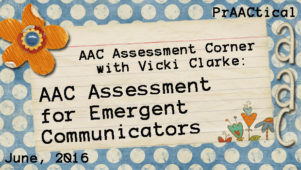
Today, we welcome back Vicki Clarke with more helpful information on conducting AAC assessments. If you work with individual who are at the early stages of communicative development, this post is for you! :::::::::::::::::::::::::::::::::::::::::::::::::::::::::: Some of my most favorite students are those who, at first, may not seem to notice me at all. Sometimes these students seem to exist in their own worlds. They don’t seem to respond in ways we would expect: looking, attending, listening, or gesturing. They may have a diagnosis of Autism, significant developmental delay, epilepsy, or any number of syndromes. I love these kids, and unfortunately, these are often the students who don’t get referred to me. Sometimes it takes years of working in a district before I get to see students with significant developmental delays. These children are typically served in classrooms for students considered to be severe/profound or multi-handicapped. Honestly, I usually get the... [Read More...]
April 18, 2016
by Carole Zangari -
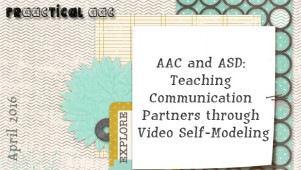
It is an honor to have Dr. Joanne Cafiero, an AAC consultant for individuals with complex communication needs and Autism Spectrum Disorders, as a guest contributor for today’s post. Dr. Cafiero is the author of Meaningful Exchanges for People with Autism an Introduction to AAC (2005). She is a consulting editor for Focus on Autism and Other Developmental Disabilities and has guest edited several of ASHA’s Perspectives in AAC. She was a member of the National Academy of Sciences Committee on Educational Interventions for Children with Autism (2001) and is currently working on an update on AAC and Autism for the Academy. In this post, she shares some of her work on video self-modeling. ::::::::::::::::::::::::::::::::::::::::::::::::: Growing research and first-person reports are illuminating the unique sensory and motor differences experienced by people on the Autism Spectrum. This new information has a huge impact on the AAC practitioner. Motor planning differences in ASD can... [Read More...]
March 24, 2016
by Carole Zangari -
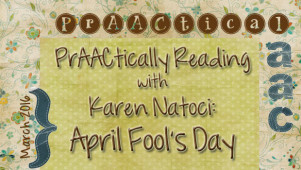
It’s gratifying to hear from so many of you who are including storybook reading in your AAC instruction and therapy. We welcome back Karen Natoci, Assistant Professor and SLP Oregon Health and Science University’s Child Development Rehabilitation Center. She serves on the Neurodevelopment and Rett Evaluation teams and has a caseload of children with Complex Communication Needs and AAC. Karen tells us that “I know very well the feeling of being overwhelmed by the high needs of students with complex communication needs and will readily admit that you have to have a very large ‘toolbox’ of ideas!” Currently, she is on the charter development team to create the Communication Matrix- Virtual Community of Practice with Charity Rowland. At the end of the day, Karen enjoys running, practicing piano, and exploring Portland and the Oregon coast. :::::::::::::::::::::::::::::::::::::::::::::::::::::::::::::::::::::::::::::::::::::::::::::::::: Book: April Fool’s Day Written and Illustrated by Dee Smith (Also available from Deesignery.com) Core Vocabulary focus: Look,... [Read More...]
March 17, 2016
by Carole Zangari -
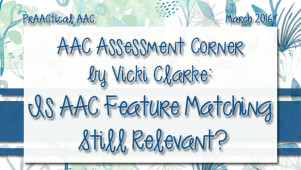
Today, we welcome back Vicki Clarke, a regular contributor to PrAACtical AAC, with another edition of AAC Assessment Corner. In this post, Vicki shares her thoughts on feature matching for AAC device selection. ::::::::::::::::::::::::::::::::::::::::::::::::::::::::::::::::::::::::::::::::::::::::::::::::::::::::::::::::::::: Feature matching has been the gold standard for AAC evaluation for the last 20 years. It is research based and clinically proven as the best technique for selecting an AAC solution for an individual. The tide of real-life practice, however, is turning and there has been increasing discussion at conferences, in social media and blogs questioning why we continue to use feature matching to place AAC systems in the hands of students. In a recent assistive technology on-line chat, a noted AT specialist remarked: “I wonder if at a district level it might not be better to have a go-to AAC system everyone tries first. If that doesn’t work then adjust.” Does this mean that we throw... [Read More...]









